
|
Astronomy Picture Of the Day (APOD)
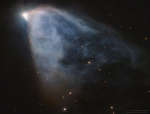 NGC 2261: Hubble s Variable Nebula
NGC 2261: Hubble s Variable Nebula
7.11.2017
What causes Hubble's Variable Nebula to vary? The unusual nebula featured here changes its appearance noticeably in just a few weeks. Discovered over 200 years ago and subsequently cataloged as NGC 2661, the remarkable nebula is named for Edwin Hubble, who studied it early last century.
 The Prague Astronomical Clock
The Prague Astronomical Clock
6.11.2017
In the center of Prague there's a clock the size of a building. During the day, crowds gather to watch the show when it chimes in a new hour. The Prague Astronomical Clock...
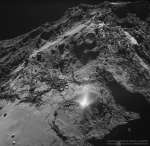 A Dust Jet from the Surface of Comet 67P
A Dust Jet from the Surface of Comet 67P
5.11.2017
Where do comet tails come from? There are no obvious places on the nuclei of comets from which the jets that create comet tails emanate. Last year, though, ESA's Rosetta spacecraft not only imaged a jet emerging from Comet 67P/Churyumov-Gerasimenko, but flew right through it.
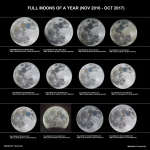 A Year of Full Moons
A Year of Full Moons
4.11.2017
Do all full moons look the same? No. To see the slight differences, consider this grid of twelve full moons. From upper left to lower right, the images represent every lunation from 2016 November through 2017 October, as imaged from Pakistan.
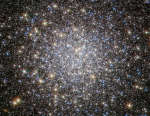 Hubble s Messier 5
Hubble s Messier 5
3.11.2017
"Beautiful Nebula discovered between the Balance [Libra] & the Serpent [Serpens] ..." begins the description of the 5th entry in 18th century astronomer Charles Messier's famous catalog of nebulae and star clusters. Though it appeared...
 A 2017 U1: An Interstellar Visitor
A 2017 U1: An Interstellar Visitor
2.11.2017
Traveling at high velocity along an extreme hyperbolic orbit and making a hairpin turn as it swung past the Sun, the now designated A/2017 U1 is the first known small body from interstellar space.
 NGC 891 vs Abell 347
NGC 891 vs Abell 347
1.11.2017
Distant galaxies lie beyond a foreground of spiky Milky Way stars in this telescopic field of view. Centered on yellowish star HD 14771, the scene spans about 1 degree on the sky toward the northern constellation Andromeda. At top right is large spiral galaxy NGC 891, 100 thousand light-years across and seen almost exactly edge-on.
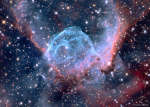 Thors Helmet Emission Nebula
Thors Helmet Emission Nebula
31.10.2017
This helmet-shaped cosmic cloud with wing-like appendages is popularly called Thor's Helmet. Heroically sized even for a Norse god, Thor's Helmet spans about 30 light-years across. In fact, the helmet is more...
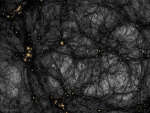 Dark Matter in a Simulated Universe
Dark Matter in a Simulated Universe
30.10.2017
Is our universe haunted? It might look that way on this dark matter map. The gravity of unseen dark matter is the leading explanation for why galaxies rotate so fast, why galaxies orbit clusters...
 Orionid Meteors from Orion
Orionid Meteors from Orion
29.10.2017
Meteors have been shooting out from the constellation of Orion. This was expected, as October is the time of year for the Orionids Meteor Shower. Pictured here, over a dozen meteors were caught in successively added exposures last weekend over Wulan Hada volcano in Inner Mongolia, China.
|
January February March April May June July August September October November December |
|||||||||||||||||||||||||||||||||||||||||||||||||